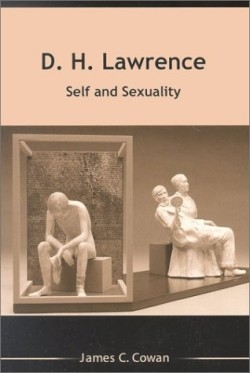
D.H. Lawrence
Self and Sexuality
“The ordinary novel would
trace the history of the diamondÃ’but I say, Ódiamond, what! This is carbon.’ And my diamond might be coal or soot, and my theme is carbon.“
Latticed in the writings of D.H. Lawrence are numerous psychosexual issues, which permeated his life and works with characteristic constancy. By reflecting the dark strengths of flawed characters, rather than allotropic purity, he tunnels deep into the darkest recesses of human sexuality with creosote carnality. Here, by the flickering of new analytical insights, the author toils to extract the raw psychological elements of Lawrence’s brilliance.
This book comes as Cowan’s latest journey into the psychological fen of D.H. Lawrence. Revisiting previous psychoanalytical criticisms of Lawrence both professionally and personally, Cowan, retired professor and founder of The D.H. Lawrence Review, considers Lawrence’s work a virtual template for the heritage of psychoanalysis, budding from Sigmund Freud to the works of Erikson and Winnicott, among others.
Despite the mantle of Freudian ideology that Lawrence traditionally bears, Sexuality further addresses psychoanalytic issues from current perspectives, namely self-psychology and object relational theories. In exploring Lawrence’s sexuality issues (phobias and fallacies) from the modern vantages of Masters and Johnson, Kinsey, and medical specialists, the book yields a resonant, personal dichotomy.
With the recurrent themes of crippling, obsessive love for a mother, as in Sons and Lovers (which pre-dated Freud’s Oedipal complex) and the idealized and nurturing male-male relationships which surge forth as in Women in Love, Cowan examines the sexual issues that became indistinguishable as fact or fiction for Lawrence. The short story “The Rocking-Horse Winner,” for example, features an ambiguously adolescent hero who strives to feed his greedy mother’s appetite for extravagance, and ultimate approval, by naming future racetrack winners while riding a nursery room rocking-horse with masturbatory fury. Lady Chatterley’s Lover, controversial and censored for its frank sexuality, mirrors the impotence and anxiety Lawrence endured from tuberculosis via a wheelchair-bound character whose wife conducts an adulterous affair. A study of Last Poems, which rounds out the book, signals Lawrence’s dark wrestling with mortality.
Solidly academic, Sexuality would best fit in the academic hands of students of Lawrence, psychology, human sexuality, literature, or related amalgams. Extensive notes and glossary follow the text, anchoring its position on a scholastic shelf. Cowan’s inspired rearranging of mirror glass shards to fit the patterns of freshly prescribed psychologies fuels the search for the latent truths which both silvered Lawrence’s writings and cast the fault lines and shifting tectonics of his reflection.
Disclosure: This article is not an endorsement, but a review. The publisher of this book provided free copies of the book to have their book reviewed by a professional reviewer. No fee was paid by the publisher for this review. Foreword Reviews only recommends books that we love. Foreword Magazine, Inc. is disclosing this in accordance with the Federal Trade Commission’s 16 CFR, Part 255.
